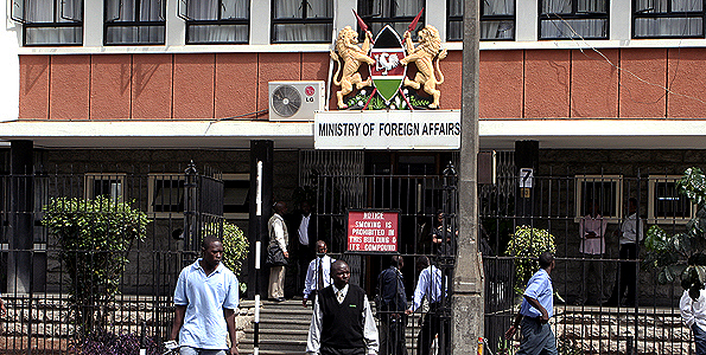State Officers Illegally Hold Secret Accounts
Despite the existence of laws that prohibit public officers from operating secret accounts outside Kenya, some still do. RoGGKenya explains these laws in detail and describes the current situation

In September 2020, the Ethics and Anti-Corruption Commission (EACC) announced that 191 public officers in foreign missions risked criminal trial. The officers were illegally operating secret bank accounts abroad.
The commission audited bank accounts held by public officers outside Kenya and uncovered unauthorised foreign bank accounts. All the accused officers are from the Ministry of Foreign Affairs.
“An audit of bank accounts held by public officers outside Kenya has established that 191 officers serving under your ministry, currently in active foreign service, are illegally operating bank accounts outside Kenya, having not declared their operation to the commission,” Twalib Mbarak, the EACC’s Secretary and Chief Executive Officer wrote in a letter to the ministry of Foreign Affairs.
“The commission has further identified 58 officers in foreign service who despite approval for their bank accounts outside Kenya, have violated the law in respect to submission of annual bank accounts. This renders them liable to the appropriate sanctions.”
Mbarak now wants the affected employees to seek approval for their bank accounts and make full disclosure of annual bank statements before October 31.
Legal actions against officers
The anti-corruption commission is considering legal action. This includes the initiation of criminal proceedings to hold non-compliant officers accountable.
The commission has further asked the Permanent Secretary Amb. Macharia Kamauto to notify all the suspects whose names are attached to Mbarak’s letter.
“The commission cautions that failure to comply with the terms of this notice will trigger the relevant enforcement proceedings,” the letter warned.
The Constitution of Kenya and the Leadership and Integrity act prohibits public officers from operating bank accounts outside Kenya, except with the approval of the EACC.
The officers also have to submit annual account statements once a year. Further, they are expected to authorize the commission to verify the statements.
The constitution gives the EACC powers to order public officers to close their foreign accounts as prescribed by notice in the Gazette.
“A state officer who does not abide by these rules, upon conviction shall be liable to a fine of up to five million shillings or up to five years imprisonment, or both.”
There is no penalty provided for public officers in the Leadership and Integrity Act.
Who is a public officer?
The constitution of Kenya under Article 260 describes a public officer as anybody who holds a public office. This includes, but is not limited to: administrators in state agencies, teachers in public schools, nurses and doctors in public hospitals.
A state officer is described as anybody who holds a public office. Which means that all provisions for public officers apply to state officers as well.
Click the HERE to get a list of state officers.
But the special provisions for state officers only apply to them and not to all public officers.
Article 76 (2) of the Constitution prohibits a state officer from maintaining a bank account outside Kenya except in accordance with an Act of Parliament.
Further, those serving in foreign missions are barred from seeking or accepting a personal loan or benefit in circumstances that compromise their integrity.
Section 19 (1) of the Act stipulates: “A State officer shall not open or continue to operate a bank account outside Kenya without the approval of the commission.”
Subsection (2) adds: “A State officer who has reasonable grounds for opening or operating a bank account outside Kenya shall apply to the Commission for approval to open or operate a bank account.”
Politicians oppose the Act
When the Act came into force in 2012, serving state and public officers who had foreign accounts at the time were required to close them within six months.
These laws that were informed by past trends where rogue public officers stashed ill-gotten wealth in overseas accounts. It is not surprising that politicians have fought them over the years.
In 2012, when Parliament was passing new integrity laws required by the Constitution, MPs rejected an amendment to the EACC Bill that sought to bar state officers from operating bank accounts in a foreign country.
An amendment moved by the former Constitutional Implementation Oversight Committee chairman Abdikadir Mohammed, which required that monies held in such accounts be repatriated to Kenya, was rejected.
The provision was subject to public discussion after the publication of the so called Panama Papers in 2016. The Panama Papers refer to the 11.5 million leaked encrypted confidential documents that were the property of Panama-based law firm Mossack Fonseca. The documents were released on April 3, 2016, by the German newspaper Süddeutsche Zeitung (SZ).
It revealed the name of a Supreme Court Judge that appeared in offshore assets database held by the law firm Mossack Fonseca.
What journalists should do
- Follow up what happens to the 191 state officers who are accused of illegally operating secret bank accounts abroad.
- Explain to your audience the various laws that relate to state officers holding secret bank accounts.
- Find out from court records if state officers have been convicted before for the crime of holding secret accounts out of Kenya.
Its like you read my mind! You seem to know a lot
about this, like you wrote the book in it or something.
I think that you can do with some pics to drive the message home a little bit, but other than that, this is great blog.
A great read. I will definitely be back.